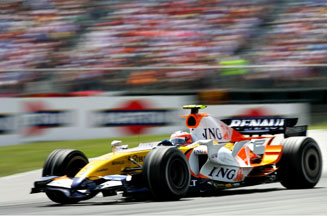
Just when one starts to think Formula One's reputation could not possibly get any worse, another catastrophe befalls the sport.
A fortnight ago, the ING Renault F1 team received a suspended two-year disqualification from competition for race-fixing, and team boss Flavio Briatore was thrown out of the sport for life. Renault had asked driver Nelson Piquet Jr to slam his car into a wall to influence the outcome of the 2008 Singapore Grand Prix.
This sorry turn of events comes almost exactly two years after the 'Spy-gate' incident, in which the Vodafone McLaren Mercedes team was caught stealing technical information from arch-rival Ferrari.
Spygate may have spooked some sponsors, but Renault's sins were less pardonable and prompted naming-rights sponsor ING to walk out on it.
Bending the rules is part of the game, as far as many fans are concerned, but lurching from one scandal to the next is damaging, even for one of the world's few truly global sports. Formula One must get its house in order if it wants sponsors to keep paying out vast sums.
Somewhere in all this mess, Jenson Button is within a whisker of securing his first championship, while his Brawn GP team could well top the constructers table in its debut year.
We asked Scott Garrett, director at sponsorship agency Synergy and former marketing director at Williams Formula One, and Robin Fenwick, head of sponsorship at Hilton and an ex-marketer for Vodafone McLaren Mercedes, how the sport can recover.
Diagnosis Two industry experts suggest how Formula One can get out of the pits
Scott Garrett director, Synergy
Formula One is not broken. Most of the commercial fundamentals that attract sponsors remain intact.
The sport is still the best way to reach a huge global audience on an annual basis, full stop. However, Formula One has an image problem caused by the actions of a few protagonists who have allowed their competitive spirit to overwhelm their sense of fair play.
Recent events, such as the Renault scandal, offer F1 a chance to address the failures in regulation and governance that allowed these lapses to occur. This opportunity must be seized by the authorities that manage the sport.
The issue is one of commercial trust. Post-recession, companies care not only about return on investment, but also about where they are seen to invest.
If F1 wants to continue to attract blue-chip investment, it needs to be perceived as a wholesome and relevant place where shareholders' money can be used to generate a return. This means providing honest, exciting competition under easily understood rules, at a price that participants, sponsors and society at large are willing and able to pay.
Remedy
- Introduce separation of powers. The Federation Internationale de l'Automobile and Formula One Management should have distinct remits.
- Stop messing with technical and sporting regulations, so that we all know the rules of the game.
- Publish a long-term plan for the sport, to include the number of teams and races, budget caps and revenue share
- Develop a commercial proposition based on 21st-century marketing principles, rather than the 80s rights-share model that generated wealth, but undermined public trust in the sport.
Robin Fenwick head of sponsorship, Hilton
Formula One has been brought to the forefront of our minds by yet another scandal. Some would say any coverage is positive, and I can see why, but the situation with Renault is very different.
A 'win at all costs' mentality may apply, but when a team deliberately affects the outcome through foul play, the integrity of the sport is questioned.
Consumers and businesses both need to be able to trust F1 and know that results have been achieved fairly through strong performances. When this is in doubt, they will start losing faith.
There is no doubt that F1 offers a phenomenal sponsorship platform, and the results Hilton Hotels has produced are beyond expectations. However, a period of stabilisation is needed.
Brands wishing to continue their association with F1, or choosing to enter the arena for the first time, will be wary of further issues arising; indeed it is likely that clauses will be added to their contracts to ensure their brand will not be brought into disrepute, and severe penalties will apply if these clauses are broken. F1 needs to distinguish itself on-track, not through situations created off it.
Remedy
- Ensure that tough, but clear and consistent penalties are given to teams found guilty of any wrong-doing.
- Should scandal emerge again, address it openly, using events to communicate directly with fans.
- Teams should adopt a more cohesive approach by working together through the Formula One Teams Association, stressing the importance of integrity in the sport.
- Issue strict working conditions and guidelines to every team member with an emphasis on morality and the need to adhere to principles of the business.

